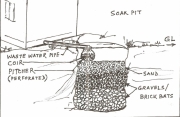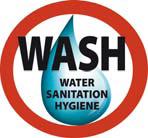/topics/toilets-and-urinals
Toilets and Urinals
Sanitation models in Trichy Tamil Nadu
Posted on 22 Nov, 2014 10:30 AMA few weeks back I had the opportunity to visit a couple of partners in Tamil Nadu. These two partners are facing a difficult task—sanitation and hygiene implementation through community participation. One project is in the urban slums of Trichy while the other one is a rural project a few hours outside of Trichy. These communities have open defecation rates of 90%. The problem mostly lies on the women. Women feel embarrassed and ashamed to go out in the open, so as a result they only go in the early mornings or late at night—basically during pitch black. Menstrual Health is a topic that is only now being addressed with organizations developing their own branch of sanitary napkin production, sold cheaply to women in rural areas. In addition to the burden on women, open defecation pollutes water sources, thereby leading to diarrhea, one of the biggest killers of children in the developing world.
India WASH forum enewsletter Update 13 July 2010
Posted on 22 Nov, 2014 10:30 AMWe see this newsletter as a platform for independent credible voice in the water and sanitation sector. Our emphasis is on bringing together critical news and information with analysis. In this issue we share news and analysis on topical issues and developments.
The Department of Drinking Water and Sanitation(DDWS) has simultaneously invited inputs to Discussion Papers on Drinking Water and Sanitation, circulated on Solution Exchange. Inputs given by India WASH Forum, on this, is enclosed in this Update. We have pointed out the missing elements of sanitation improvement strategy that include, criticality of providing water as an inseparable component to household sanitation, the tendency to see behavior change as a lifestyle issue and not linked to the hardware components, peoples livelihoods and living conditions. Suggestions for what needs to be done to strengthen the implementation mechanism of the flagship sanitation programme(TSC) and partnerships.
Impact assessment of Nirmal Gram Puraskar NGP awarded panchayats A report by TARU
Posted on 22 Nov, 2014 10:30 AMThe Total Sanitation Campaign (TSC) of the Rajiv Gandhi National Drinking Water Mission (RGNDWM), Govt of India was launched to cover all households with water and sanitation facilities and promote hygiene behaviour for overall improvement of health of the rural population. Panchayati Raj Institutions (PRIs) were involved in scaling up the TSC to promote large scale social mobilisation to bring about behavioural change.
Round up of the water news for the week ending 31st May 2010 Six sewage treatment plants coming up in tsunamiaffected areas of Nagapattinam TN
Posted on 22 Nov, 2014 10:30 AMSome recent news items from the news feed that India Water Portal maintains at Newsrack: (http://newsrack.in/stories/arghyam/Water/55) :
- Six sewage treatment plants coming up in tsunami-affected areas of Nagapattinam, TN : http://www.thehindu.com/2010/05/31/stories/2010053157650600.htm
School water sanitation and hygiene education Paper by Water for People
Posted on 22 Nov, 2014 10:30 AM This document by Water for People, emphasises the importance of appropriate sanitation coverage in schools that is gender sensitive and culturally acceptable to the needs of both boys and girl students, rather than the exclusive focus on adequacy of facilities.
This document by Water for People, emphasises the importance of appropriate sanitation coverage in schools that is gender sensitive and culturally acceptable to the needs of both boys and girl students, rather than the exclusive focus on adequacy of facilities.
It discusses the case of schools in rural areas in West Bengal where it was found that although the coverage of sanitation facilities was reasonable, lack of adequate availability of water, lack of consideration to student differences in terms of age and gender in the construction of latrines and drinking water facilities, poor systems of maintainence and disposal of wastes made the sanitation facilities inappropriate for use.
Urban Population and WatSan: A brief status report by WaterAid 2009
Posted on 22 Nov, 2014 10:30 AMThis document by WaterAid India, India highlights the poor water and sanitation situation in the urban slums in India, in the context of rapid urbanisation and the increase in the number of slums and slum dwellers in the cities.
Bihar needs to build 6900 toilets a day to keep promise of total sanitation A survey report by WaterAid 2009
Posted on 22 Nov, 2014 10:30 AMThis brief report highlights the findings of an evaluation study conducted by WaterAid, India of the Total Sanitation Campaign (TSC), a national programme in India that ensures sanitation facilities in rural areas to eradicate open defecation. The study was conducted in the five states of Bihar, Chhattisgarh, Tripura, Karnataka and Haryana. This document highlights the findings of the evaluation study in the state of Bihar.
Financing onsite sanitation for the poor : A six country comparative review and analysis A report by WSP World Bank
Posted on 22 Nov, 2014 10:30 AMThis report by the Water and Sanitation Programme (WSP) draws attention to the fact that a very high percentage (40%) of the population in the world does not have access to basic level of sanitation, which has serious health consequences and puts a considerable economic burden on the poor. The report explores the issue of what can be the most appropriate financing mechanisms to meet the sanitation needs of the poor.
Rejuvenation of community toilets A policy paper by UNHABITAT and Government of Madhya Pradesh
Posted on 22 Nov, 2014 10:30 AM The policy paper examines the condition of community toilet in terms of its infrastructure, operation & maintenance, uses and payment of user charges. The paper is a result of a joint collaboration between Water for Asian Cities (WAC) Programme of UN-HABITAT and the Directorate of Urban Administration & Development, Government of Madhya Pradesh.
The policy paper examines the condition of community toilet in terms of its infrastructure, operation & maintenance, uses and payment of user charges. The paper is a result of a joint collaboration between Water for Asian Cities (WAC) Programme of UN-HABITAT and the Directorate of Urban Administration & Development, Government of Madhya Pradesh.
In Madhya Pradesh, WAC is supporting Asian Development Bank-financed project in cities of Bhopal, Gwalior, Indore and Jabalpur to improve and expand urban water and sanitation services. This study has been taken up to monitor implementation of the water and sanitation related targets.
Empowerment through action: The story of Anna Lakshmi
Posted on 22 Nov, 2014 10:30 AMThis article shows how women are catalysts for advocating widespread improved sanitation and – at the same time – reap substantial benefits in a program promoted by an NGO called Gandhigram Trust. The empowerment of women and marginalized populations is a vital step in realizing gender equality – equal access, planning, and management – for water and sanitation.






